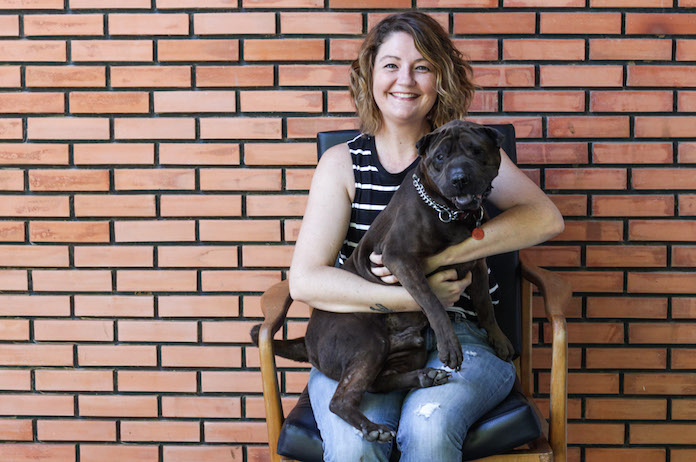Succeeding In Business

Startups continue to mushroom in Cambodia, with the field wide open to locals and foreign ventures. New entrants are not just gunning for spots in the food and beverage, tourism or hospitality industries, but are also stretching into niche areas such as pet stores cum cafe and coworking spaces, and even building a chain of stores through franchise. Whatever form the business takes, one thing remains. To survive in this competitive landscape, value addition is key. This includes offering quality products and services, and fostering a loyal client base. We speak to industry insiders about their respective value propositions.
A void in the market
When Tisha Shelley first moved to Phnom Penh with her Sharpei, she found limited options for healthy dog food and pet supplies. There was also a lack of suitable places for dogs to run around and pet owners to mingle. Hence, Edgar Allan Paw was conceived. The pet supplies store has a dog-friendly, off-leash cafe where dogs and their owners can meet up.

“The idea is to provide everything you need for your dog or cat under one ‘woof’!”, explains Shelley. By that she means decent pet food, training tools, fun and pretty homewares for your pet, and cleaning products that are natural and of high quality. “We also make pet food onsite using supplements and minerals to increase the quality of your pet's diet, and provide information and support for natural options against parasites such as ticks and fleas.”
For Chhundara Khorn, the ticket to doing business in the Kingdom came in the form of a franchise. While these carry a certain guarantee of brand recognition and business backing, one still needs to keep raising the bar to stay competitive. And that’s exactly what this CEO of KOI Cafe (Cambodia) is doing with the Taiwanese tea brand that he and his partners brought into the Kingdom two years back. KOI now has five stores in Phnom Penh, with two more set to open in June.

“When I was considering the business, the market and the product just felt right,” Dara says of his decision to set up shop in Cambodia. “There were a few tea brands that just opened and were proving to gain quite a lot of attention from the consumer. The market then wasn’t big yet, but it looked promising and poised for growth. In our quest for products, we tried a number of different brands and met with different companies. After a series of trials, we found that the products that KOI was offering were much superior to others, and their vision and mission of quality and service were also aligned with ours.” And so the deal was sealed.
Charting the course
For now, it is the only business that Dara is running. “I want to take my time with the business and keep a strong focus on building a strong team, creating effective management and operation systems, and implementing the right policies to ensure a steady and sustainable growth,” he explains. In Cambodia though, not all businesses flourish. Quite a number have quickly gone bust as soon as they’ve spread their welcome mats. The culprit: the lack of market research and feasibility studies. “I personally like to use Porter's Five Forces as well as the SWOT analysis when considering a business,” shares Dara. “It's important for entrepreneurs to clearly know their own strengths, the product strengths, the customers, and the market conditions, to name a few. Those pieces of information help provide them with a clearer picture of their intentions. Decisions made with a lack of such information is equivalent to shooting in the dark, which is very risky. It's important to note that an entrepreneur is not a risk-taker, but rather a risk-avoider or minimizer.”
As for Shelley, she explains that she’s “been really lucky to have worked with and learned from a variety of amazing entrepreneurs and small businesses throughout my career in radio and digital marketing, and knew exactly what I wanted my brick-and-mortar store to look like, and how to make customers happy. The rule of thumb is customer service. I'm here to provide a space and service to customers, and that will ultimately lead to our success.”
Winning strategies
Service at Edgar Allan Paw is 24/7. It prides itself in delivering anytime for any need. “We provide support day or night for our customers’ pets if they are ill, or hurt or if someone finds a sick dog,” adds Shelley. The menus and stock list are regularly updated, with customers actively asked to try new products and to provide feedback. “We are creating a community who guides us, and that will ultimately drive business growth.” According to Shelley, for any business in Cambodia to succeed, it is important to diversify and know when to cut your losses. “Don't rely on one line item to make your business grow. Keep adding to the mix and bettering what you offer. Never reach the point where you just sit day to day and don't work on improving what you do. If something is not working or costing you too much money, time or stress, cut it and move onto something that will work for itself.”
“Though the market in Cambodia is growing, it's still small and swaying,” reminds Dara. “The barrier to entry is low and new brands are joining in regularly. Because everything is new for the people in Cambodia, it's very common for them to sway from one product to another and from one brand to the next. Therefore, to stay in business, it's critical to create a warm and friendly customer service experience, ensure consistent high quality and good taste, choose convenient locations, maintain a good atmosphere and decoration, strong branding, and a good customer relationship management.”
Quality over price
When it comes to pricing, “Customers should never feel that the products are overpriced,” Dara maintains. “Normally, any pricing within the industry's relative range should be okay if you can justify the price against your quality. You don't have to necessarily use your competitor's pricing as the main factor in your decision making. Other factors such as product quality and customer service can be prioritized.”
According to Shelley, price is not the only factor involved in choosing products or services. “There are hundreds of studies to show this. In fact, businesses that are successful cultivate community, reputation and a service level that is unbeaten. In our case, while we may have more expensive treats, pet food or toys, we also provide education and support that help our consumers understand why we sell what we do. The option is then theirs to choose as they like. In our case, when you understand the long-term effects or dangers of cheap food, or treats, it's a no-brainer to spend the money now than later on vet's bills while your pet is in pain. We are lucky to have the customers that we do, and we have to show them that no matter how often they come, price stops being an issue in the long-run.”
Tapping social media
Both KOI and Edgar Allan Paw are big on social media. “With such overwhelming number of users/viewers, Facebook and other forms of social media can play a vital role in helping a business grow in the Kingdom,” says Dara. “For KOI, we have never spent money on advertisements on traditional channels. Most of our marketing budget is spent on creating content for use on social media. This platform has been a significant route for branding and marketing purposes.”
Shelly primarily advertises, educates and cultivates its community through social media. “I left Hootsuite, a leading social media management company to come here, and I know intrinsically that social media will drive growth if it's done right,” shares Shelley. “Stop thinking of it as a business page and start showing your customers what you're about, who you are and give them value in liking your page. The only other tactic we work on is public relations. We need more people to know about us, and based on my experience, you can do amazingly well with very little cash, but a lot of time spent instead growing your online reputation. Did you know that one person is exposed to roughly 5,000 ads a day? Yours will make no difference to that mix unless you give consumers a reason to want to learn more about you.”